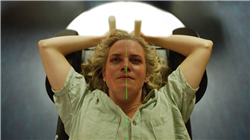In Monster Scripted’s seven-episode series “Afterglow,” hailing from Norway, Ester – mother, wife and a friend – finds out she has cancer. But instead of giving in to pain, she “demands joy,” actress Nina Ellen Ødegård told Variety at Canneseries after its premiere in main competition. REinvent handles sales.
“She gets desperate, in a way, and I find it so true,” she says about her spirited character who refuses to be victimized. Ødegård, also a regular in supernatural Nordic noir “Seizure,” embraced – and loved – Ester’s failings.
“After seeing the first episodes again, I thought: ‘I am so rude!’ But we wanted to show her being as human as possible, so that others can hopefully recognize themselves in her struggle. I haven’t experienced illness [knocks on wood], but when I became a mother, I was also obnoxious to my friends. I always felt like I didn’t have enough time. Once you experience something life-changing, you do become a bit greedy.”
“Afterglow,” created by Atle Knudsen and Kjetil Indregard (who co-wrote the show with Mads Løken), hit close to home for Knudsen, however, who went through a similar experience after his wife, journalist Vera Micaelsen, was also diagnosed with cancer.
“The first thing that happened was that Monster sent Atle and me to ‘a spa,’ as they do, to write a relationship drama,” says Indregard.
“We couldn’t come up with anything and then Atle said: ‘What about a story about a guy who might lose his wife to cancer?’ Which was exactly the position he was in at that moment. I thought this might be the most important thing I would ever work on as a writer. It’s about life and death, it’s real, painful and beautiful. I remember Atle’s wife saying that ‘one day you will die, but all the other days you will live.’”
Despite all the heartbreak it was important to look for the light in the show.
“That’s what Ester wants. She says [to her family and friends]: ‘We have to do something cool, have to keep seeing each other.’ The whole series is about that. About trying to find that hope,” adds Knudsen, who also directs, pointing out that while Ester is the star, “Afterglow” is very much an ensemble, populated with quirky, lovable characters.
“Because of what happens to her, everyone else takes a closer look at their own existence. ‘What am I doing? How do I bring happiness into my life?’ There are so many humorous moments that come from it,” he says, with producer Ida Håndlykken Kvernstrøm adding that while Ester’s friends finally acknowledge they will be gone one day, it pushes them to live their life to the fullest.
Kvernstrøm, also behind dramedy series “Pørni,” about a single mom trying her best to survive daily dramas, reflected on another complex female character coming from Monster Scripted.
“Maybe there are many female leaders at Monster and they have a strong voice? Or maybe that’s the vibe in Norway right now, this combination of sadness and laughter?” she wondered.
Ester’s relationship with her astrophysicist husband (“Vikings” Thorbjørn Harr) was also crucial.
“Nina and Thorbjørn, they told us: ‘Their love is the protagonist of the show’,” says Indregard.
“That’s so beautiful and we didn’t even think of that – the actors did. Their love is the protagonist and cancer is the antagonist, trying to take it away. I am so annoyed we can’t take credit for it.”
But while the show’s tender approach to a difficult subject echoes Laura Linney starrer “The Big C,” the team was set on telling their own story.
“We just worked with our hearts and tried to find the truth. Thinking that if it will feel true to us, then maybe it will be unique,” says Knudsen, describing the whole process as “full of joy.” But “Afterglow” could still rub one group of people the wrong way: the combative members of “BeyHive,” aka Beyoncé’s fans, all thanks to one risqué joke.
“I wrote it. I am sorry,” says Indregard.
“I love Beyoncé! Maybe I should start posting about it right now,” wonders Ødegård.
“All jokes aside, it’s important for these characters to not be politically correct all the time. No one here is just good or bad: they are all human. To me, that was the most important thing.”
Source: Read Full Article
